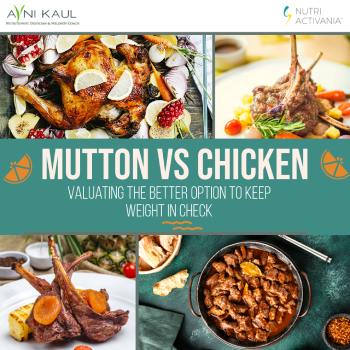In the never-ending debate of mutton versus chicken, the battleground mostly extends beyond flavour and texture to health considerations, specifically, in relation to the weight loss program by Dietician Avni Kaul. Both types of meat provide unique nutritional profiles that could influence weight management strategies. In this post, India’s leading dietician Avni Kaul, who offers one of the most sorted weight loss diet programs, delves into the qualities of mutton and chicken to evaluate which could be the better option for keeping weight in check.
What about mutton?
Mutton, derived from mature sheep, is renowned for its rich flavor and tender texture. It is filled with protein, essential vitamins, and minerals. However, mutton tends to be richer in fat content compared to chicken. While fat is an important macronutrient, excessive consumption could contribute to weight gain. The fat content in mutton differs depending on the cut, with some cuts containing more fat than others. For instance, lamb chops or shoulder cuts tend to have higher fat content compared to leaner cuts like loin or leg.
What about chicken?
On the other hand, chicken, particularly skinless chicken breast, is widely recognized as a lean protein source. It is low in fat and calories, making it a popular choice for weight-conscious individuals. Chicken breast is not only lean but also packed with protein, which is essential for muscle maintenance and repair. Moreover, chicken is versatile and can be prepared in numerous ways, accommodating various dietary preferences and culinary preferences.
Which one, mutton or chicken is good for weight management?
When it comes to weight management, the calorie density of foods has a crucial role. Mutton, being higher in fat, usually contains more calories per serving compared to chicken. Eating calorie-dense foods in excess can lead to weight gain over time. Therefore, individuals targeting to manage their weight may find it beneficial to opt for leaner protein sources like chicken, as it allows them to consume larger portions while keeping calorie intake in check.
Also, the method of preparation also affects the calorie content of the final dish. While both mutton and chicken can be grilled, baked, or stewed, the addition of oils, sauces, or marinades could significantly increase the calorie count. It is important to choose cooking methods that minimize added fats and calories to support weight management goals.
Apart from calorie content, the nutritional composition of mutton and chicken differs in terms of micronutrients. Mutton is a fine source of iron, zinc, and B vitamins like vitamin B12 and niacin. These nutrients play essential roles in energy metabolism and overall health. However, excessive consumption of red meat, including mutton, has been associated with an increased risk of certain health conditions such as cardiovascular disease and certain cancers.
Chicken, though lower in certain nutrients compared to mutton, is still a valuable source of essential vitamins and minerals. It has niacin, vitamin B6, phosphorus, and selenium, all of which are important for maintaining optimal health. Moreover, chicken is mostly considered a healthier option because of its lower saturated fat content, which is linked to cardiovascular health.
Both mutton and chicken can be included in a balanced diet, but when it comes to weight management, chicken emerges as the better alternative. Its lean protein quantity, lower calorie density, and versatility make it a suitable choice for individuals looking to maintain or lose weight. However, moderation is key, and incorporating a variety of protein sources, including mutton, can contribute to a well-rounded and nutritious diet. Eventually, making informed choices based on personal preferences and dietary goals is essential for achieving and maintaining a healthy weight.
- Amazing Indian Foods to Lower Your Blood Pressure Level Naturally - April 26, 2024
- Fruits That Can Help You Lose (or Maintain Your) Weight - April 23, 2024
- What are the Potential Health Benefits of Raw Sprouts? - April 20, 2024

